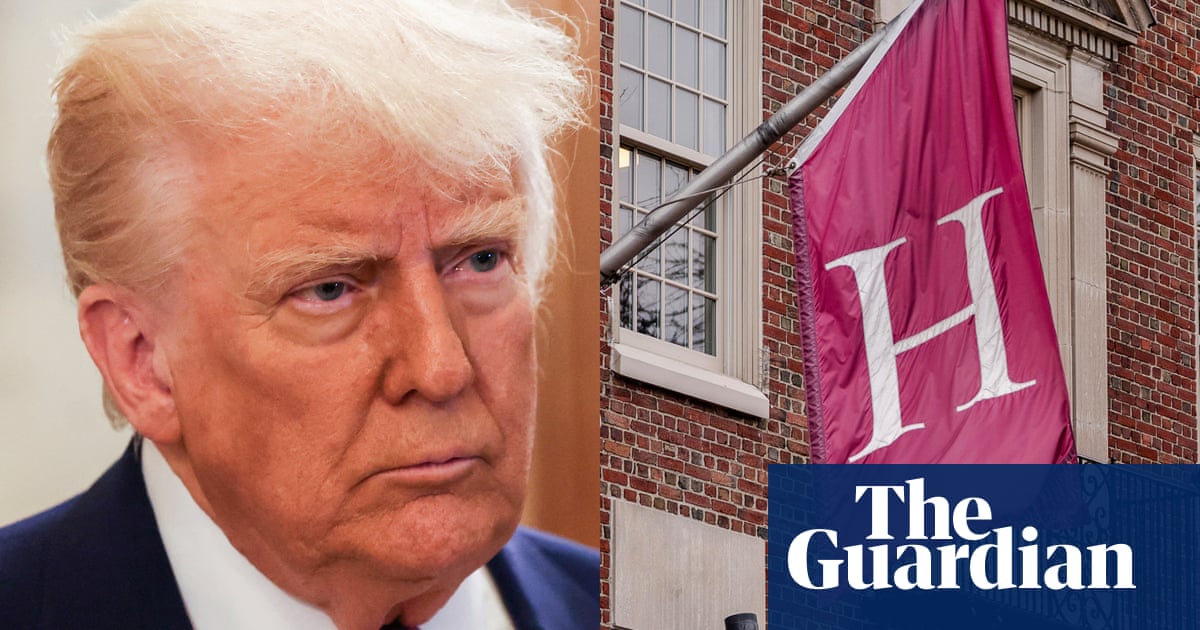The Trump administration’s announcement on Thursday that it wouldrevokeHarvard University’s eligibility to enroll international students marked the most severe escalation yet in its weeks-longshowdownwith the university.
The move, which the university is likely to challenge in court, would force more than 6,000 currently enrolled students to transfer to other universities or lose their legal status, according to theDepartment of Homeland Security. The announcement sent shock waves through US universities already reeling from funding cuts and executive efforts to bring them in line with the administration’s agenda, but it will also add yet another element of uncertainty for international students after the administration abruptly terminated the legal status of thousands in recent weeks – a move it partiallywalked backbut that has nonetheless disrupted students’ education and upended their lives.
Education advocates denounced the administration’s latest attack against Harvard as a gross overreach that they warn will damage US students as well. “International students are not bargaining chips – they are scholars, researchers and contributors to our communities whose presence strengthens US higher education and society,” said Fanta Aw, CEO and executive director of Nafsa, the Association of International Educators. “We turn global talent away at our own expense”.
International student enrollment was already expected to decline for the upcoming academic year in light of recent policies by theTrump administrationand bureaucratic hurdles that preceded it. But the latest announcement is certain to further destabilize the plans of students from abroad who were hoping to enroll at US universities this fall.
A significant drop in foreign student enrollment will have serious consequences for universities’ finances at a time when many are already feeling the pinch. About 65% of international students in the US pay for tuition out of pocket – a figure that rises to 80% for undergraduate students, according to theInstitute for International Education. That’s far more than the number of US students who pay full tuition, as a vast majority of them receive at least some financial aid.
There were more than 1 million international students in the US during the last academic year, contributing about $43.8bn to the economy, according to ananalysisby Nafsa. At Harvard, international students make up roughly 27% of the student body, a figure in line with that of other Ivy Leagueuniversities. But tens of thousands of international students also attend other institutions, private and public, with New York University, Northeastern University, and Columbia University boasting the largest number of international students – withmore than 20,000each.
Beyond their tuition dollars, on which many universities have come to rely, international students make major contributions to a variety of fields. One in four US startups worth more than $1bn have at least one founder who was an international student, and international students have created or supported more than 378,000 US jobs, according to Nafsa.
The administration’s attempts to retaliate against universities by targeting international students are “shortsighted” but will have “long-term consequences”, warned Fanta Aw, the group’s CEO and executive director.
“The US has benefited from the brain trust of the world for decades,” she said, adding that many countries were eager to woo international students away from the US.
This spring, Harvard became a prime target for Trump’s retaliation after itsuedthe administration over its funding cuts – the first, and so far only, university to do so. For now, it is the only university the administration has barred from hosting international students – a move it had anticipated.
Last month, the university told admitted foreign students that they could simultaneously accept offers at both Harvard and at universities abroad – something it had never allowed before. In an email, admissions officials cited “recent events here in the United States and at Harvard” and recognised that foreign students may want a “backup plan”.
But Harvard’s current and prospective international students are not the only ones whose education in the US is on the line. Advocates had already warned of dropping enrollment in light of the recent visa revocations as well as the targeting of some pro-Palestinian students fordetention and deportation. Those only add to pre-existing bureaucratic obstacles, including rising visa denial rates – from 15% a decade ago to 41% last year – and slow visa processing.
A full accounting of the impact of Trump’s policies won’t be possible until the fall, when universities are required to report their matriculation data. But a globalsurveyof universities published earlier this month shows some early signs, including graduate student enrollment that dropped 13% this spring, while a separateanalysis of student visasshowed a 14% drop in the number of visas issued so far this year.
Those trends will only be compounded by billions in funding cuts that have already destabilised research institutions and risk sending talented students elsewhere, analysts warn.
“It certainly adds to the stress of a prospective or current international student who, in addition to worrying about immigration policy, has to worry about whether they will have uninterrupted funding if they’re doing a PhD,” said Julia Kent, vice-president, best practices and strategic initiatives, at the Council of Graduate Schools, a group promoting graduate education and research. She noted that some foreign students were so anxious about the administration’s campaign against foreign students that they feared driving their cars.
“It’s creating a climate of chaos and uncertainty.”
So far, universities have attempted to mitigate the impact of Trump’s policies, discouraging foreign students fromtraveling abroadduring breaks and offering to connect them withimmigration attorneys. But that’s not much in the face of an administration willing to go to unprecedented lengths in its effort to submit universities to its will.
Chris Glass, a professor of education at Boston College who researches international student trends pointed to a nationwide campaign during the first Trump administration during which universities responded to the Muslim ban bypublishing videostelling international students: “You are welcome here.” None of that is happening now.
“Obviously universities see the federal government is willing to use extraordinary forms of power, without precedent,” said Glass. “We’re just in a different environment.”
